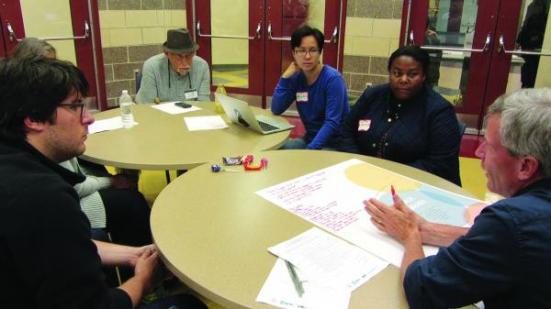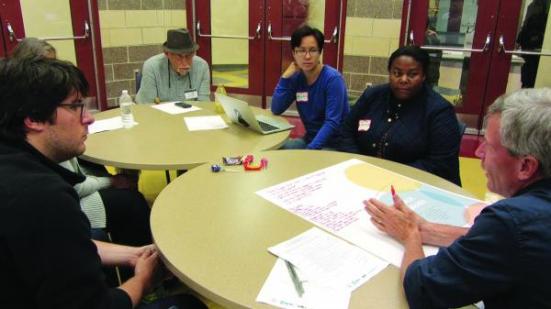Note: This post originally appeared on UEP Senior Lecturer and Director of Community Practice Penn Loh’s personal blog.
How does community participation influence community development and the residents who engage? How can civic participation be strengthened so that communities gain more control over their destinies? These are the questions that Tufts UEP and Dudley Street Neighborhood Initiative (DSNI) will be pursuing over the next two years. The participatory research project is entitled From Civic Participation to Community Control: Assessing and Strengthening Participatory Planning for Commercial District Development Without Displacement in Boston’s Dudley Neighborhood. (See executive summary below.) The partners have a unique opportunity to research the collaboration between City of Boston and DSNI to revitalize Upham’s Corner into an arts and innovation district.

(Dorchester Reporter, Jennifer Smith photo)
The partners recently won one of sixteen grants awarded in a nationwide research competition sponsored by the Corporation for National and Community Service (the federal agency that hosts Americorps). According to CNCS, “This competition focuses on engaging communities in conversations about their civic health using participatory research approaches to facilitate civic engagement and strengthen community capacity to address local issues…”
This research project builds on UEP and DSNI’s Co-Research/Co-Education partnership, which launched in 2016 with support of Tisch College and a seed grant from Tisch College Community Research Center. Funding of $50,000 per year will be shared equally between Tufts and DSNI and will support graduate students and community resident researchers, as well as UEP faculty and DSNI staff.
DSNI Interim Executive Director Denise Barros says, “we have always known that residents have the capacity to direct the future development of the neighborhood. Now we have the resources to research how community control happens and use the results to improve public planning processes.”
According to Tufts UEP Senior Lecturer Penn Loh, “we were well positioned for this federal grant because of our decades long partnership. Knowledge isn’t produced in academia and then applied in the real world, but rather university and community co-produce new knowledge through collaborative research and practice.”
Executive Summary
From Civic Participation to Community Control: Assessing and Strengthening Participatory Planning for Commercial District Development Without Displacement in Boston’s Dudley Neighborhood
This project will explore how civic engagement can strengthen community capacity for control over land use and economic development in Boston’s Dudley neighborhood. Since the Dudley Street Neighborhood Initiative (DSNI) was formed in 1984, it developed its own master plan and has fostered development of 226 units of affordable housing, parks, a greenhouse, and urban farms on 32 acres owned by its community land trust. This neighborhood has a highly developed civic infrastructure, built by organizing, participatory planning, and community ownership of land. Dudley has become a nationally renowned model for community control that can guide development without displacement.
Tufts Department of Urban & Environmental Policy & Planning (UEP), a graduate planning program, has been working with DSNI since 1990. UEP and DSNI established a 3-year Co-Research/Co-Education partnership in 2016 to investigate and advance strategies for community control of land and the local economy. This project will build on our partnership to pursue strategies for commercial development without displacement, with a focus on the Upham’s Corner commercial district. This district is on the eastern edge of the 1.3 square mile Dudley neighborhood, which is still a predominantly lower-income community of color with ~30,000 residents.
Despite the high degree of civic infrastructure and success with developing permanently affordable housing, the neighborhood still is in social crisis, experiencing persistent poverty and high un/underemployment. Thus, DSNI has begun exploring how its organizing, planning, and land ownership can support commercial development that can produce good jobs and support locally-owned businesses.
Specifically, this project will assess the impacts of civic participation in the planning process for revitalizing Upham’s Corner into a commercial arts innovation district. DSNI’s land trust recently acquired a former bank building and has been co-coordinating a planning process over the last year with City of Boston, which owns two other key redevelopment sites. This development is a major focus for neighborhood-based planning in the City of Boston’s Imagine 2030 comprehensive plan.
This project will conduct a participatory assessment of the impacts of engagement on the development process and outcomes in Upham’s Corner, as well as civic infrastructure. The overall question is how the development process can go beyond resident input into a City decision-making process towards more direct forms of democratic resident control of those decisions. DSNI has already achieved direct control over housing development through its land trust and now is trying to exercise this power in commercial development. What difference does community control make to the development process and civic infrastructure? How can we measure engagement and strengthen capacity for community control?
In the first year, the project will train and support a resident research team to conduct interviews and focus groups with residents engaged at various levels in the process. Tufts researchers will interview City of Boston officials and other community leaders appointed to the advisory group guiding. In the second year, the project will develop and pilot measures and strategies for strengthening civic infrastructure for effective community engagement, community control, and community economic development.
Expected outcomes include more capacity within DSNI and among Dudley residents to conduct participatory assessments, deeper understanding of the impacts of community engagement and measures of community control, deeper relationships between DSNI, City, and other stakeholders, and lessons learned that can be more broadly shared with other practitioners and researchers.
